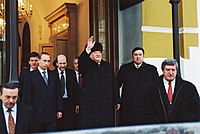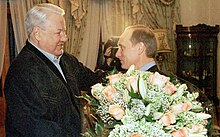2000 Russian presidential election
[1] Incumbent prime minister and acting president Vladimir Putin, who had succeeded Boris Yeltsin after his resignation on 31 December 1999, sought a four-year term in his own right and won in the first round.
In spring 1998, Boris Yeltsin dismissed his long-time head of government, Viktor Chernomyrdin, replacing him with Sergey Kirienko.
Months later, in the wake of the August 1998 economic crisis in which the government defaulted on its debt and devalued the rouble simultaneously, Kirienko was replaced in favor of Yevgeny Primakov.
[2] Putin was not expected to last long in the role and was initially unknown and unpopular due to his ties to the Yeltsin government and state security.
In the late summer and early fall of 1999, a wave of apartment bombings across Russia killed hundreds and injured thousands.
[8][9] In early 2000 Unity and the Communist Party had developed an alliance in the Duma that effectively cut off Putin's rivals, Yevgeny Primakov, Grigory Yavlinsky, and Sergei Kiriyenko.
[3] Yuri Luzhkov, the reelected Mayor of Moscow, announced that he would not compete for the presidency; Primakov pulled out two weeks after the parliamentary elections.
Zyuganov ran on a platform of resistance to wholesale public ownership, though he supported a return of illegally privatized property to the state.
[10] Analysis of television coverage of the 1999 Duma and 2000 presidential elections found that “it was ORT, and state television more generally, that had helped to create a party on short notice”[4] and that “its coverage… was strongly supportive of the party it had created.”[4] Further, TV channel ORT aggressively attacked credible opponents to Unity and Putin.
He stated that he believed in “free press” but this should not let the media become “means of mass disinformation and tools of struggle against the state.”[2] He encouraged the state-owned media to control the market and provide the people with “objective information.”[2] The decision to conduct the presidential elections also in Chechnya was perceived as controversial by many observers due to the military campaign and security concerns.
[12][13] The PACE observers delegation concluded that "the unequal access to television was one of the main reasons for a degree of unfairness of the campaign" and that "independent media have come under increasing pressure and that media in general, be they State-owned or private, failed to a large extent to provide impartial information about the election campaign and candidates.
The TV channel ORT launched a slanderous campaign against Yavlinsky's image as his ratings started to rise sharply, and broadcasters generally nearly ignored candidates who did not fulfill interests of their owners.
Multiple Western journalists (such as the Boston Globe's David Fillipov) had been either detained or expelled from the country because they strayed from Russian military guidance in Chechnya.
[15] Under both Yeltsin and Putin, the Kremlin apparatus was applying financial pressure to Media-Most, a media holding group which had been unfriendly in their coverage.



